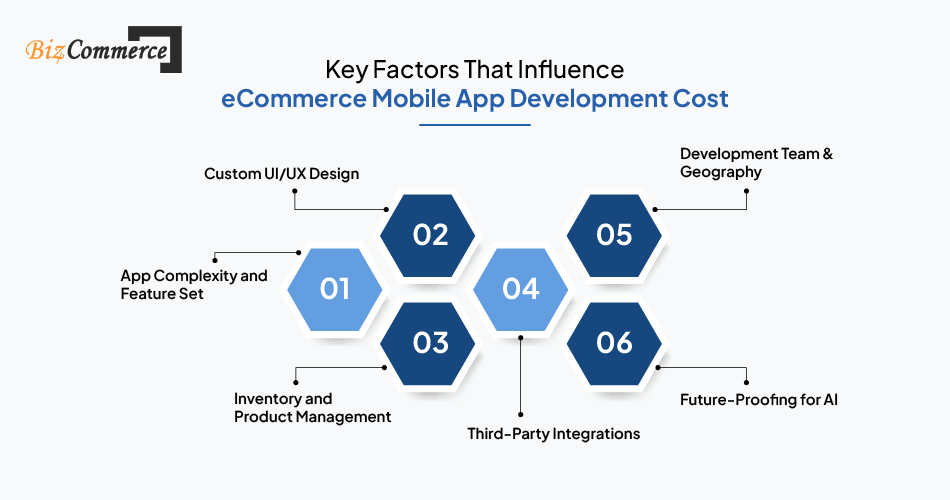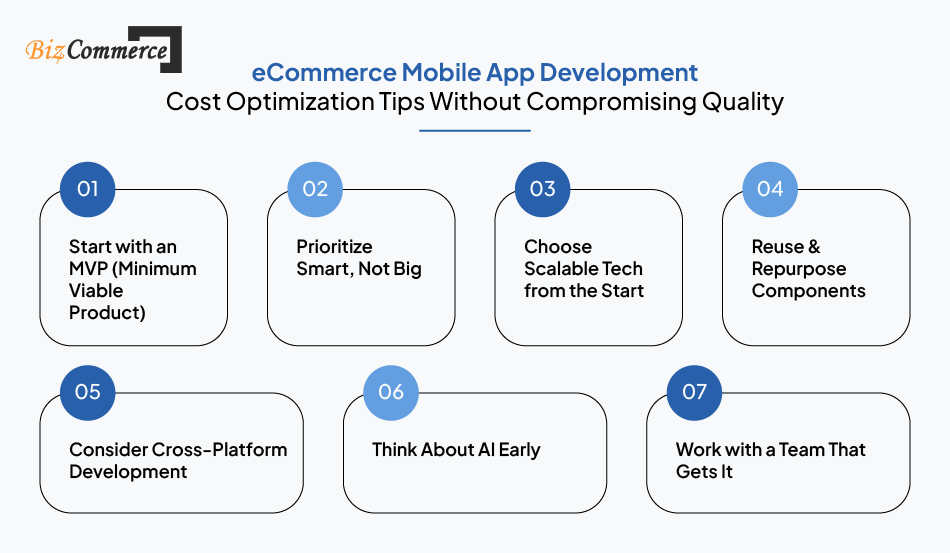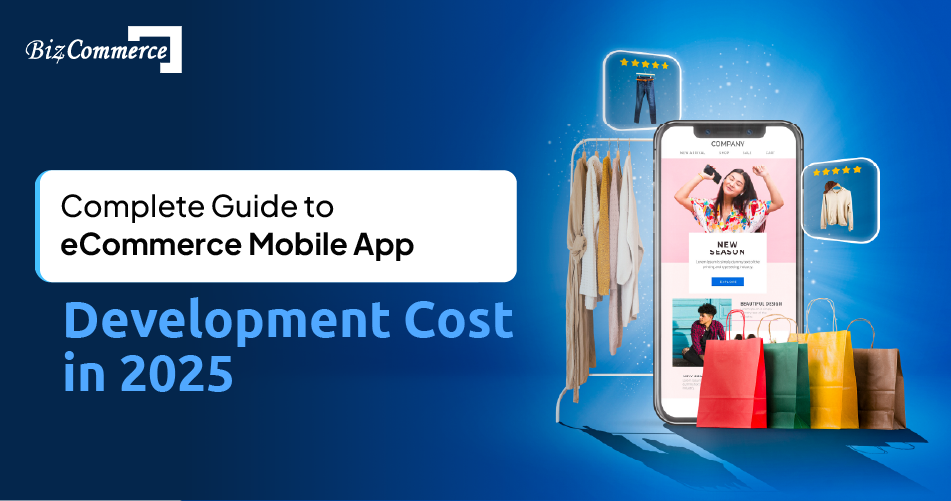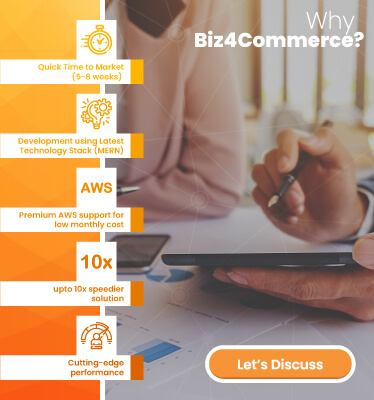Complete Guide to eCommerce Mobile App Development Cost in 2025
Let’s be real— asking “How much does it cost to build an eCommerce app?” is like asking, “How much does a car cost?” It depends. Do you want a smart electric SUV with autopilot, or a reliable compact that gets the job done?
In the world of mobile commerce, the same logic applies. Whether you’re a startup selling hand-poured candles or a furniture brand scaling B2B reorders, your app’s features, platform, and architecture will directly shape your ecommerce mobile app development cost.
But here's the thing—2025 isn't the year to cut corners.
Mobile commerce is now the default shopping experience. Customers demand sleek UI, personalized journeys, one-click checkouts, and yes—AI that gets them. That’s why businesses are turning to specialized AI development services to bake intelligence into their apps from day one.
In this guide, we’ll unpack what really drives the ecommerce mobile app development cost, what features make the biggest impact (and dent in your wallet), and how AI, scalability, and smart development choices can influence your ROI—dramatically.
So, if you’re searching for clarity, numbers, and a no-fluff roadmap, you’re in the right place.
Key Factors That Influence eCommerce Mobile App Development Cost

If you’ve been wondering why one business builds a shopping app for $15,000 and another spends over $70,000, the answer lies in the details. The ecommerce mobile app development cost isn’t one-size-fits-all—it’s shaped by decisions you make long before a single line of code is written.
Here’s what drives the budget:
1. App Complexity and Feature Set
The more your app does, the more it costs. It’s that simple.
- Basic apps: Include product catalogs, cart, and payment gateway.
- Mid-range apps: Add wishlists, user accounts, reviews, and loyalty modules.
- Advanced apps: Integrate AI recommendations, multi-vendor support, AR product previews, and dynamic pricing.
Each layer of complexity multiplies design, development, and QA time.
2. Custom UI/UX Design
A cookie-cutter layout might be cheaper upfront, but custom UI built around your audience’s behavior is what sets serious apps apart. Investing here increases engagement and builds long-term brand equity.
3. Inventory and Product Management
Is your app just a product showcase, or are you syncing inventory in real-time across warehouses and sales channels? Complex data logic can increase development hours. Our insights into product management for ecommerce show how robust backend systems directly impact performance.
4. Third-Party Integrations
CRMs, ERP systems, payment gateways, live chat, loyalty tools—the more integrations you require, the more work is needed behind the scenes. These can raise costs depending on complexity and documentation availability.
5. Development Team & Geography
A local US agency comes with higher hourly rates but often delivers faster timelines and fewer communication lags. Offshore developers may lower the cost, but consider management and quality assurance overhead.
6. Future-Proofing for AI
Even if you don’t plan to launch with AI, your architecture should allow for it. Otherwise, retrofitting AI for personalization, chatbots, or analytics becomes costly. Planning with AI in mind early on helps reduce long-term ecommerce app development cost.
Build an AI-Powered eCommerce App
Personalize customer journeys and automate sales with custom AI integrations.
Hire AI App ExpertseCommerce Mobile App Development Cost Breakdown by App Type
So how much does it really cost to build an ecommerce app? Well, the answer depends on the size of your vision. Whether you're building a sleek app for a boutique or a full-featured platform for a retail empire, understanding the tiers of complexity is key.
Below is a breakdown of ecommerce mobile app development cost based on common app types.
|
App Type |
Core Features |
Estimated Cost Range |
|---|---|---|
|
Basic eCommerce App |
Product listing, search, cart, checkout, basic CMS |
$15,000 – $25,000 |
|
Mid-Level App |
Wishlist, reviews, user login, push notifications, coupon codes |
$25,000 – $45,000 |
|
Advanced App |
AI product suggestions, AR visualization, real-time sync, multivendor dashboard |
$45,000 – $70,000+ |
What Drives These Cost Ranges?
- Design depth: Custom UI/UX takes time and adds cost.
- Data structure: Larger catalogs and SKUs require more backend complexity.
- User roles: B2C is simple; B2B with contract pricing, RFQs, and volume orders adds complexity.
- AI features: We'll get into this next—but yes, intelligent systems influence the ecommerce app development cost
Advanced apps often feature AI-powered product suggestions, smart assistants, and personalization tools—similar to those used in ecommerce virtual assistant development that enhance customer engagement and boost sales conversions.
If you’ve ever asked, “how much does it cost to build an ecommerce app that scales?”, the answer lies in choosing the right app tier and feature set for your audience—and business goals.
eCommerce Mobile App Development Cost by Platform
One of the most important (and early) decisions you'll make is: Which platform are you building for—Android, iOS, or both? And trust us, it’s not just a tech question—it’s a budget one.
The ecommerce mobile app development cost can vary widely depending on your platform choice, especially when factoring in testing, UI adjustments, and long-term support.
Here’s how it typically breaks down:
|
Platform |
Best For |
Estimated Development Cost |
|---|---|---|
|
iOS App |
Brands targeting high-end US-based users |
$15,000 – $40,000 |
|
Android App |
Wider market reach with device variety |
$15,000 – $35,000 |
|
Cross-Platform |
Faster time to market, single codebase |
$25,000 – $60,000 |
So, How Do You Decide?
- If you’re starting lean and targeting just one segment, Android or iOS is cost-effective.
- If speed, efficiency, and reach are critical, cross-platform frameworks like Flutter or React Native help lower overall ecommerce app development cost without sacrificing quality.
Cross-platform frameworks (like React Native) or custom builds using stacks such as the mern stack e-commerce platform can dramatically reduce coding efforts and support long-term scalability.
And if you’re wondering how much does it cost to build an ecommerce app with room to scale later—this is where smart platform planning saves time and money down the line.
Cost by Development Approach
Let’s be honest—your development partner can make or break both your timeline and your budget. While the ecommerce mobile app development cost depends heavily on your feature wishlist and platform, it’s your choice of team that ultimately decides how smooth (or chaotic) your project will be.
Let’s break down the major options and how they stack up.
|
Development Approach |
Pros |
Cons |
Estimated Cost Range |
|---|---|---|---|
|
Freelancers |
Low upfront cost, flexible schedule |
Limited scalability, varied code quality, less accountability |
$8,000 – $20,000 |
|
In-House Team |
Full control, better collaboration |
High long-term overhead, slow to scale |
$80,000+ annually |
|
eCommerce App Development Company |
Full-cycle support, specialized skills, post-launch service |
Higher initial investment |
$25,000 – $70,000+ |
What’s the Smart Move?
If you’re looking for speed, reliability, and expert input—partnering with a firm offering end-to-end ecommerce development services is often the most balanced and cost-effective choice. These teams already know how to choose the right stack, avoid scalability pitfalls, and build for the long game.
Plus, with post-launch support, you won’t be scrambling for fixes when customers are already inside your app.
Don’t Overspend on Development
Our team helps you balance features, tech, and scalability without breaking your budget.
Book a Free ConsultationHow AI Features Influence eCommerce App Development Cost?
In 2025, building an ecommerce app without AI is like opening a store without lights. You can technically function—but good luck impressing customers.
Modern users expect more than product listings. They want intelligent search, smart recommendations, and lightning-fast service. That’s where AI comes in—and yes, it directly impacts your ecommerce mobile app development cost.
Why Add AI?
AI brings automation, personalization, and efficiency across your app ecosystem. Some of the most in-demand AI features include:
- Product Recommendations: Personalized suggestions based on browsing behavior and purchase history.
- Visual Search: Let users upload a picture and find similar items instantly.
- Chatbots & AI Assistants: Automate 24/7 customer service, upsell offers, and reduce cart abandonment.
- Voice Commerce: Hands-free navigation and shopping via voice commands.
- Dynamic Pricing & Forecasting: Adjust prices in real-time based on demand, trends, or inventory.
These upgrades don't just improve customer experience—they increase retention, conversion rates, and overall ROI.
How Much Does AI Add to the Cost?
Expect to invest an additional $5,000 to $20,000+ depending on the scope. For example, integrating a custom AI assistant might add $8K, while building AI-driven analytics and personalization engines could climb beyond $20K.
It’s also worth noting that the complexity of AI integration can vary based on your tech stack and backend readiness. If your app is built with scalable architecture, the lift is easier—and cheaper.
Let’s Talk Implementation
At Biz4Commerce, our AI experts work alongside app developers to integrate intelligence that aligns with your business goals. Whether it’s personalized journeys or predictive analytics, our AI product development services are tailored to ecommerce.
You can also explore AI integration services if you have an existing app that needs an upgrade. And for a hands-free shopping experience, our custom chatbot development team builds solutions that go far beyond scripted responses.
Planning to deploy these AI features at scale? You’ll benefit from our enterprise AI solutions, built for robust performance across mobile and web.
And if you're curious how these capabilities compare to traditional ecommerce features, take a peek at what goes into AI ecommerce assistant systems and AI ecommerce personalization. They’ve reshaped how businesses convert browsers into buyers.
eCommerce Mobile App Development Cost Optimization Tips Without Compromising Quality

Let’s say you don’t have a $70,000+ budget just lying around (shocking, we know). That doesn’t mean you have to settle for a clunky or underwhelming app. It just means you need to be strategic.
Here are practical ways to reduce your ecommerce mobile app development cost without sacrificing functionality—or user experience.
1. Start with an MVP (Minimum Viable Product)
Focus on the core features first: product listings, cart, checkout, user profiles. Launch faster, get feedback, then scale. This approach can trim 30–40% off your initial budget.
2. Prioritize Smart, Not Big
Instead of building 50 features upfront, prioritize 5 that will move the needle—AI search, personalized feeds, or push notifications, for instance.
3. Choose Scalable Tech from the Start
Opting for modular architecture and cloud-native platforms pays off. It makes your app easier to expand without rewriting everything later.
4. Reuse & Repurpose Components
From payment gateways to product grids, don’t reinvent the wheel. Use well-supported open-source modules and tested UI libraries.
5. Consider Cross-Platform Development
If speed and reach matter more than native performance, a cross-platform app helps cut costs by nearly 25% while maintaining consistency across iOS and Android.
6. Think About AI Early
Even if you’re not launching with AI today, build an infrastructure that can support it tomorrow. Planning ahead reduces future rework—and cost.
7. Work with a Team That Gets It
Partnering with a team that specializes in ecommerce (not just generic apps) saves both time and missteps. An experienced development partner can help you strike the perfect balance of cost, performance, and scalability.
Looking for a Reliable Tech Partner?
Work with one of the best ecommerce development companies in the industry.
Contact UsReal-World Pricing Examples
Understanding theory is great—but let’s bring it down to dollars and cents. Below are a few real-world ecommerce app scenarios to give you clarity on what you might actually pay.
|
Scenario |
App Type & Features |
Estimated Cost |
|---|---|---|
|
Startup Boutique (B2C) |
Basic product catalog, search, cart, Stripe payment, push notifications |
$15,000 – $25,000 |
|
Mid-Tier Brand (B2C + AI) |
Personalized recommendations, chatbot integration, loyalty engine |
$30,000 – $45,000 |
|
B2B + B2C Hybrid App |
Role-based pricing, bulk orders, quote requests, customer groups, smart catalog |
$45,000 – $60,000+ |
|
Enterprise App (Full AI Suite) |
Cross-platform, multilingual, AI product feeds, AR try-ons, enterprise ERP and CRM integration |
$70,000 – $100,000+ |
Key Takeaways:
- AI-driven features add value—but also cost. However, the ROI in personalization and automation often outweighs the initial bump in budget.
- B2B apps are more complex. Contract-based pricing, approval workflows, and volume handling push development cost higher.
- eCommerce mobile app development cost is an investment in growth. Apps are no longer a “nice to have”—they’re your frontline sales tool.
Looking to estimate your project cost more accurately?
Our team helps businesses navigate tech decisions, scope planning, and budgeting every day. You can Get Quote for your eCommerce Website based on your unique feature list and launch plan.
Plus, if you're considering intelligent automation or B2B-specific flows, our experience in b2b ecommerce with AI makes us a trusted partner for complex implementations.
Speaking of B2B—if you're curious how AI agents can handle quotes, contracts, or client-specific pricing, check out how benefits of b2b e-commerce increase when paired with modern tech stacks.
Final Thoughts: Why Choose Biz4Commerce
By now, it’s clear: the ecommerce mobile app development cost depends on a blend of choices—platform, features, AI readiness, and development approach.
But one thing remains true no matter your business size or model: you need a partner who understands both ecommerce and technology.
At Biz4Commerce, we don’t just code. We build scalable, AI-powered shopping experiences with growth in mind. From intelligent product feeds to enterprise-ready integrations, we create mobile apps that are fast, flexible, and future-proof.
Whether you're launching a boutique app or a full B2B-B2C hybrid with automation and personalization baked in, we’ve got the expertise—and the team—to get it done right.
Here’s what sets us apart:
- Deep domain expertise in B2B and D2C platforms
- Proven ability to scale, backed by successful AI-first projects in ecommerce AI agent development and more
Not to mention, we’ve been the best ecommerce development company for a reason—our results speak for themselves.
Let’s Build Your App, Together
Want to talk timelines, features, or ballpark costs? We’re just a click away.
Explore what’s possible with Biz4Commerce—and make your mobile app the smartest move you make this year.
FAQs:
eCommerce Mobile App Development Cost
1. What is the minimum budget required to develop a basic eCommerce mobile app?
A basic eCommerce app with essential features like product listings, cart, and checkout typically starts around $15,000. This price may vary depending on the region of your development team and platform choice (Android, iOS, or cross-platform).
2. How long does it take to develop an eCommerce app?
Development timelines can range from 8 to 20+ weeks. A basic app might take 2–3 months, while a mid-level or advanced app—especially with AI features—can take 4 to 6 months or more.
3. Does using a cross-platform framework reduce development cost?
Yes. Cross-platform frameworks like Flutter or React Native can reduce total development costs by up to 25–30%, especially for businesses planning to launch on both iOS and Android.
4. Is AI necessary for an eCommerce mobile app?
While not strictly necessary, AI adds immense value. Features like personalized recommendations, chatbots, and predictive analytics enhance user experience and conversion, making it a high-ROI addition if budget allows.
5. What hidden costs should I be aware of?
Beyond initial development, consider ongoing costs such as:
- App store fees (Google Play, Apple App Store)
- Hosting and server management
- Maintenance and updates
- Marketing and user acquisition
- Third-party API licenses
6. Can I start with basic features and add advanced ones later?
Absolutely. This is known as MVP development. Starting lean and scaling with user feedback is often more cost-effective and aligned with long-term goals.


